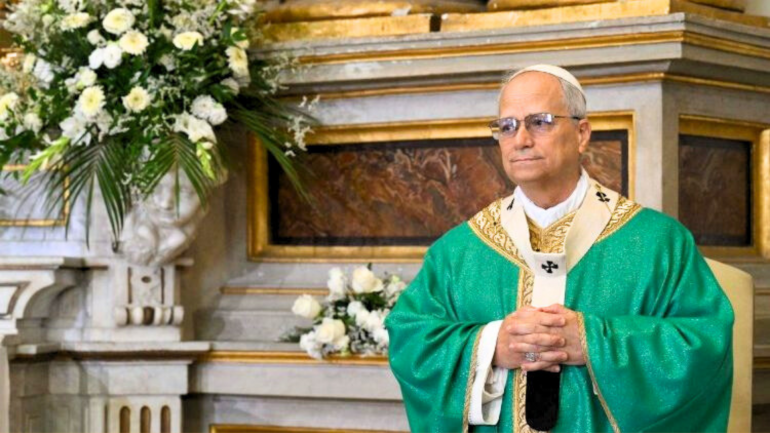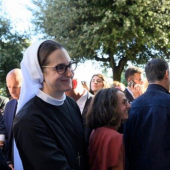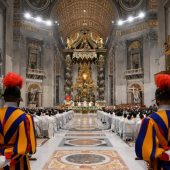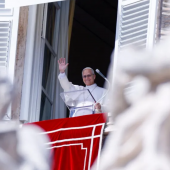Pope Leo XIV: “To Inherit Eternal Life Is to Love and Serve”

In a moving Angelus address delivered in Piazza della Libertà, Pope Leo XIV urged the faithful to rediscover the path to eternal life through a life of love, service, and compassion.
Speaking before a large crowd gathered in the papal summer residence of Castel Gandolfo on Sunday, July 13, the Holy Father reflected on the day’s Gospel from Luke, in which a man asks Jesus, “What must I do to inherit eternal life?”
The Pope emphasized that eternal life is not something to be earned through effort or bargaining, but rather a divine inheritance freely given. “Eternal life is bestowed on us as an inheritance,” he said. “And to receive it, we must live according to God’s will—loving Him with all our heart and our neighbor as ourselves.”
He reminded the crowd that this commandment is more than moral advice; it is a mirror of God's own love for humanity, revealed in the life of Christ.
Pope Leo described Jesus as the living image of divine love: a love that forgives without hesitation, offers itself freely, and always draws close to the brokenhearted.
“In Christ, God made himself a neighbor to every man and woman,” he said. “We too are called to bring hope and consolation to those around us—especially those discouraged or forgotten.” To live eternally, the Pope explained, is not about escaping death, but about embracing life here and now through concrete acts of mercy, justice, and solidarity. “This is the law that gives meaning to all other laws,” he added.
He closed the Angelus prayer by entrusting everyone to Mary, Mother of Mercy, and prayed that hearts be opened to God’s saving love and stirred to build peace in everyday life.
After the prayer, Pope Leo turned his attention to the beatification of Lycarion May, a Marist Brother martyred in 1909 in Barcelona. He praised the newly beatified as a courageous witness of faith and a source of inspiration for educators around the world.
The Pope also offered greetings to various international pilgrim groups present in Rome for Jubilee events, including faithful from Peru, Colombia, Spain, France, and Poland; the Diocese of Bergamo; Augustinian nuns in formation; and a children’s choir from France’s Académie Musicale de Liesse.
He offered special recognition to 100 cadets from Italy’s Velletri Carabinieri School, encouraging them in their training and public service.
Pope Leo expressed appreciation for educators and volunteers leading summer initiatives for youth, and commended the Giffoni Film Festival, whose theme this year is “Becoming Human.”
Before concluding, the Pope issued a heartfelt appeal for peace. “Let us not forget those in pain. May our prayers reach every corner where peace is wounded,” he said. With a warm smile and wave to the crowd, he ended with a simple blessing: “I wish all of you a happy Sunday!”
This Angelus marked the first time in 12 years that a pope has led the traditional Marian prayer from Castel Gandolfo, the scenic town 18 miles southeast of Rome. The prayer, delivered under a warm but slightly overcast sky, was the midpoint of Pope Leo’s two-week summer stay at the papal estate, reviving a tradition paused under Pope Francis, who had chosen not to vacation at the site.
Earlier that morning, Pope Leo celebrated Holy Mass at the Pontifical Parish of Saint Thomas of Villanova, a 17th-century church overlooking Liberty Square. The Mass was attended by local Catholics, religious leaders, and civil authorities, further deepening the spiritual atmosphere of the day.
The Pope is expected to lead the Angelus again on July 20 before returning to the Vatican for a busy schedule of Jubilee of Hope events, including jubilees dedicated to Catholic influencers and youth.
He is also scheduled to return briefly to Castel Gandolfo for the Italian holiday of Ferragosto (August 15–17), which coincides with the Solemnity of the Assumption of the Blessed Virgin Mary.
Radio Veritas Asia (RVA), a media platform of the Catholic Church, aims to share Christ. RVA started in 1969 as a continental Catholic radio station to serve Asian countries in their respective local language, thus earning the tag “the Voice of Asian Christianity.” Responding to the emerging context, RVA embraced media platforms to connect with the global Asian audience via its 21 language websites and various social media platforms.











